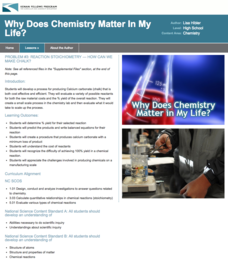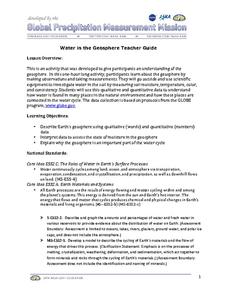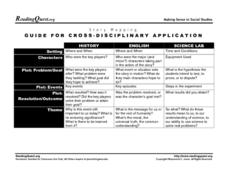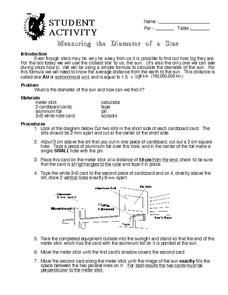Curated OER
Saliva Lab
In this saliva worksheet, high schoolers conduct an experiment to test how saliva breaks down starches. Students complete 6 short answer questions.
Science 4 Inquiry
The Yin and Yang of Photosynthesis: Day vs. Night
Floating fragments of elodea can grow even without roots. Young scientists use eldoea plants to observe the oxygen production from photosynthesis. They study the difference between having access to high amounts of light and low amounts...
Kenan Fellows
Reaction Stoichiometry—How Can We Make Chalk?
What is a reasonable percent yield in the manufacturing process? Scholars develop a process for producing chalk in the third lesson of a six-part series. Then, they must determine the theoretical and percent yield. Discussions about...
Curated OER
Investigating an Enzyme-controlled Reaction: Catalase and Hydrogen Peroxide Concentration
Are you looking for a way to measure cellular respiration? Try it with pureed potatoes. With some standard high school science equipment, biologists can perform an investigation and collect data surrounding byproducts of respiration. You...
Curated OER
Ice Cream
Open this instructional activity by giving a brief history of ice cream. Using liquid nitrogen to lower the temperature, preteens make their own confection. The accompanying activity sheet queries learners about freezing point, the...
Curated OER
Alcoholic Fermentation in Yeast
Biology learners investigate the effect of sucrose concentration on yeast alcoholic fermentation. During the lesson,they compare and contrast the processes of cellular respiration and alcoholic fermentation. They design an experiment to...
Curated OER
Reading the River
In collaborative groups, young ecologists measure the temperature, pH, and dissolved oxygen for three different freshwater samples. They examine each sample with a microscope and record observations on the microorganisms in the pond...
Curated OER
Water in the Geosphere
Through a PowerPoint presentation and the embedded animation and video, earth science enthusiasts find out about the moisture in the soil beneath our feet. In the animation, follow a water molecule on its path through the water cycle. As...
Texas State Energy Conservation Office
Investigation: Gas Laws in Action - Propane
Using helium as an example of propane, physical science middle schoolers experiment with and graph the relationship between temperature and volume in gases. In a whole-class demonstration, they show how molecules behave under different...
Curated OER
Story Mapping: Guide for Cross-Disciplinary Application
In this story mapping instructional activity, students read how story mapping can apply to 3 different areas of study: history, English and science lab. The components of story mapping that are included here are setting, characters,...
Curated OER
Group Rotation
Ninth graders review lab equipment safety procedures and utilize safe and behavior while there. They then edit and combine digital photographs to create realistic images using Adobe Photoshop.
Curated OER
Life in a Forest Stream
Students assess macro-invertebrates from a stream. In this science lesson plan, students observe, classify and identify organisms found in a stream. A lab station is constructed at the stream sight and students study the different...
Curated OER
Design Project: Signal Generator
In this physics worksheet, students design and build a signal generator. They write a lab report and answer 4 short answer questions about their design.
Curated OER
Reflecting on Reflectivity
Students plan and construct a "mini-lab" to measure the reflectivity of different earth surfaces. They measure reflectivity of materials, including ice, soil, rocks, etc., and then extrapolate from what they have learned to consider the...
Curated OER
Safe and Sanitary Work Habits - Level 1
Students brainstorm hazards in the kitchen, and categorize them. They develop a checklist that could be used by an inspector to evaluate a home economics foods laboratory. They create a recipe while using proper lab and safety procedures.
Curated OER
Marine Biology Field Trips
Students visit a Marine Biology study area 2-3 times and write a report after the last visit. They participate in the Marine Biology field trips working with lab partners. They complete data sheets to write their primitive environmental...
Curated OER
The Motion of a Virus Through a Population
Students test the factors that influence the rate at which a virus spreads through a population. They complete a lab activity then discuss data collected and review and answer a set of questions.
Curated OER
It Keeps Going & Going &...
Students extend linear and directional patterns, identify patterns in classroom and community environments, create original patterns incorporating the senses of sight and sound, and operate video and recording equipment.
Curated OER
The Frigid Gourmet
Students make a " science surprise" or ice cream in the lab. In this melting point depression lesson plan, students use various substances with ice to determine the effects on the melting point of ice and the ability to make ice cream....
Curated OER
Measuring The Diameter of a Star
In this space science activity, students find the correct measurements using the tools provided in this lab experiment. The second page is used to record data.
Curated OER
Does Dye Die? Foreign Chemicals in Our Environment
Students conduct an experiment to observe photolysis in the lab. In this chemistry lesson, students explain the mechanism behind photolysis. They test the impact of a non-toxic marker to plant metabolism.
Curated OER
Density Of A Material
Students determine the density of a material created in the laboratory and observe physical and chemical changes. They engage in a lab activity, and answer questions on a worksheet imbedded in this plan.
Curated OER
Energy and Changes of State
Students complete a variety of labs to help them explain how energy affects the changes in states of matter. They also be required to collect and record data, graph data, and apply interpretations of that data.
Curated OER
Science: Bees: An Interdisciplinary Approach
Students investigate the world of bees and describe their characteristics. by identifying the bees' parts, they demonstrate how these parts function. In the lab, students dissect bees and view the various parts under microscopes. ...
Other popular searches
- Identifying Lab Equipment
- Science Lab Equipment
- Lab Equipment Quiz
- Basic Lab Equipment
- Chemistry Lab Equipment
- Using Lab Equipment
- Lab Equipment Worksheet
- Classroom Lab Equipment
- Use of Lab Equipment
- Biology Lab Equipment
- Science Lab Safety Equipment
- Chem Lab Equipment

























